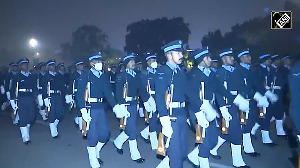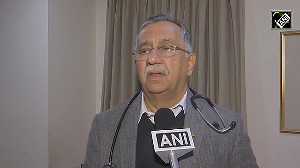 Indian diplomat Devyani Khobragade has asked a court in New York to dismiss the indictment against her and terminate any ‘open’ arrest warrants in the visa fraud case, arguing that she was ‘cloaked’ in diplomatic immunity and cannot face criminal prosecution in the United States
Indian diplomat Devyani Khobragade has asked a court in New York to dismiss the indictment against her and terminate any ‘open’ arrest warrants in the visa fraud case, arguing that she was ‘cloaked’ in diplomatic immunity and cannot face criminal prosecution in the United States
Khobragade's lawyer Daniel Arshack had on Tuesday filed a memorandum of law on her behalf in the Southern District of New York in support of the motion to dismiss the case and terminate any future legal action against her "on grounds of diplomatic immunity."
"Dr Khobragade now formally moves this court to dismiss the instant proceeding, to rescind the conditions of her release, and eliminate her bail conditions as she is immune
from criminal prosecution in the United States as she was obligated, by the United States government, to leave the jurisdiction," Arshack said in the filing.
Arshack is seeking a court order to dismiss the indictment and proceeding against the Indian diplomat, terminate any and all conditions of bail previously imposed by the court during Khobragade's initial appearance on December 12 and exonerate any bail or bond previously posted on her behalf.
The motion is also seeking termination of any "open arrest warrants" against Khobragade or "requests for extradition" with regard to the case as "they too are nullities since the instant proceeding is subject to dismissal."
"I make this affirmation in support of Khobragade's motion to dismiss the instant proceeding as a nullity because both at the time of her arrest, as well as at the time of her
subsequent indictment, the defendant was cloaked in diplomatic immunity and has absolute immunity from any criminal prosecution in the United States," he said.
Arshack is seeking a ruling on the order by Judge Shira Scheindlin on or before January 31.
The office of Manhattan's top federal prosecutor Preet Bharara, who brought the criminal charges and indictment against Khobragade, said they have "no comment at this time" on the motion filed by Arshack.
The filing states that because of Khobragade's diplomatic status, the court did not have personal jurisdiction over her at the time of her arrest and indictment, but it still has subject matter jurisdiction to rule over her motion to dismiss the case.
Arshack argued that conditions of Khobragade's post-arrest release and the $250,000 bond must be rescinded as those restrictions on the 39-year-old diplomat's liberty do not apply since she is "absolutely immune from criminal prosecution" being a diplomat.
He also sought "prompt return" of Khobragade's passport.
The motion informed the court that Khobragade had full diplomatic immunity at the time of her arrest on December 12 since she had been appointed a Special Advisor to the United Nations in August last year during Prime Minister Manmohan Singh’s visit to attend the UN General Assembly session.
"Obviously, the government knew when it obtained that indictment that there could be no prosecution of Khobragade since her diplomatic status had already been changed and she was therefore immune from prosecution," Arshack said, adding that it was due to her diplomatic status that Khobragade did not get arraigned on the indictment.
Arshack said Khobragade's immunity "should have prevented" her arrest, handcuffing, jailing, strip searching and imposition of bail conditions.
"This proceeding has been wrongfully commenced against Khobragade. She should not have been arrested in the first place. She was indicted despite the fact that the government knew that her diplomatic status precluded a prosecution of Khobragade."
Arshack also cited the US State Department's instructions which provide that law enforcement officials (particularly in New York) should be sensitive and coordinate with the US authorities if confronted with a situation where a diplomat appears to have committed a crime.
He said the law enforcement agent from the Diplomatic Security Services who arrested Khobragade "neglected" to follow this instruction and did not call the UN Protocol office.
"Had he only done so he would have been informed of Khobragade’s status and her arrest and humiliating and invasive personal body search would not have occurred."
According to another State Department instruction cited by Arshack, diplomatic agents also enjoy complete immunity from the criminal jurisdiction of the host country's courts and cannot be prosecuted no matter how serious the offense unless their immunity is waived by the sending state.
"Here, India, the sending state, has not waived Khobragade's immunity and therefore this criminal prosecution must be dismissed," he added.
Arshack further argued that Khobragade's immunity applies "retroactively" and can "negate a preexisting matter or prosecution."
"Here, the State Department's decision to fully grant diplomatic credentials mandates the dismissal of this action in accordance with Article 31 of the VCDR and the Diplomatic
Relations Act.
"Obviously, a case was clearly commenced. Despite the fact that no arraignment occurred, Khobragade was arrested, physically searched, processed, brought before the court, forced to post bail, and abide by conditions of release all in violation of her absolute immunity as a diplomat," he added.
Arshack also submitted in court a letter dated January 8, 2014 from the US Mission to the UN to Khobragade, which states that as of 5.47 pm that day, she had been recorded as a counselor at the Indian Mission to the UN and was entitled to the "privileges and immunities" of a diplomatic envoy.
Another exhibit submitted by him is a January 9 diplomatic note from the US Mission to the UN to India's Permanent Mission requesting Khobragade to depart the US.
Image Courtesy: https://www.facebook.com/devyani.khobragade/











 © 2025 Rediff.com -
© 2025 Rediff.com -